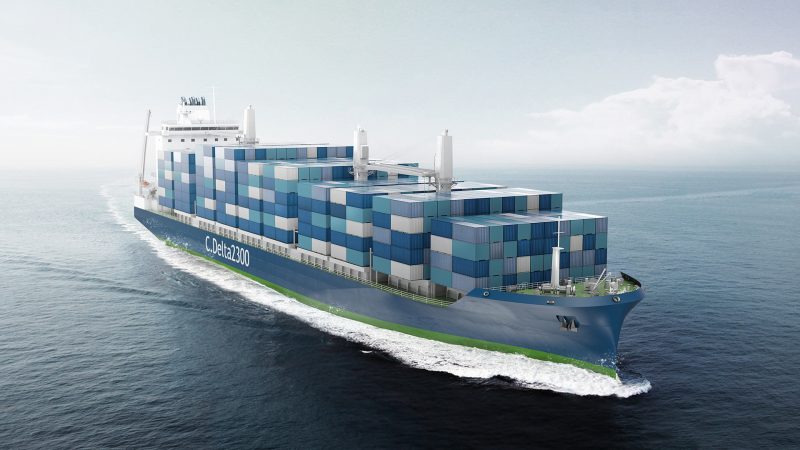Deltamarin introduces the new state-of-the-art LNG-powered Kielmax container vessel of the C.Delta series, C.Delta2100. This new design is based on extensive research and development work to establish the best-in-class design in terms of cargo capacity, flexibility and fuel economy, as well as the proven performance of the built Polar Code C.Delta2150 design. It provides a flexible platform for a whole series of designs, which can be adapted to various customers’ requirements as a result of several optional feature studies. The platform design is “future-proof”, taking into consideration possibilities to use alternative fuels to reduce carbon footprint or even zero-emission power production.

The choice of the main dimensions (length, breadth, block coefficient in combination with a larger propeller) in total results in a higher speed respective in less power demand at the design speed/contract point compared with reference designs.
The platform design includes ice class 1A for unlimited Baltic Sea operation. The vessel is equipped with lashing bridges to access reefer containers.
Increased cargo-carrying capacity
The C.Delta2100 provides a container capacity of 2,100 TEU in four cargo holds and on deck. The increased cargo hold breadth improves stability in the fully laden condition. This results in an increased utilisation rate of about 75% (1,595 TEU) of nominal container intake in the homogeneous loading condition at scantling draught carrying a’ 14t TEU containers. Furthermore, intake can be optimised to a specific cargo profile and even further improved by considering route-specific loading.
Container sizes L 20’/40’/45’x B 8’/2500mm x H 8’6/9’6, able to accommodate pallet wide, HC containers in holds (max. 5 tiers) and on hatches, 45’ container bays arranged on some of hatch covers as well as one bay in the hold.
Flexibility
The high flexibility of the C.Delta2100 allows pallet-wide 40’ container stowage as well as three tiers of high cube containers in the cargo hold without losing container slots. Additionally, a high number of reefer plugs allows smart stowage and the reduction of unnecessary container movements. These features provide efficient and fluent stowage.
Excellent fuel efficiency
Extensive effort has been focused on the C.Delta2100 hull form development to ensure low resistance combined with high propulsion efficiency. This included dozens of CFD calculations and three series of model tests at the Hamburg Ship Model Basin (HSVA). The performance has been proven in C.Delta2150 sea trials.
The daily main-engine fuel oil consumption using LNG (tier III) 30.8 t/day + pilot oil 0.8 t/day at a 18-knot service speed results in superior fuel efficiency of less than 0.015t LNG/TEU/day at design draft.
A low deadweight per TEU ratio of about 15.2 DWT/14t TEU is thus achieved, which is commonly gained only in larger container ships. The vessel complies with EEDI Phase 3.
Main Particulars of C.Delta2100:
| Length overall | 179.40 m |
| Breadth | 31.00 m |
| Draught, design | 8.50 m |
| Draught at Kielmax | 8.50 m |
| Draught, scantling | 10.00 m |
| Capacity | 2,100 TEU |
| Capacity at 14 t/TEU | 1,595 TEU |
| Reefer plugs | 450 |
| Deadweight at design draught | 18,500 t |
| Deadweight at Kielmax draught (FW) | 17,750 t |
| Deadweight at scantling draught | 25,300 t |
| Service speed (15% sea margin) | 18.0 kn |
| Main engine | MAN 6G60ME-C10.5-GI-EcoEGR-TIII or equivalent |
| SMCR | 11,500 kW |
| NCR | 9,775 kW |
| LNG tank capacity | 2*480 m3 |
Optional features for customisation
Optional features of the C.Delta series include higher LNG capacity, methanol, ammonia, hydrogen as fuel, a flexible number of reefer plugs, shaft generator PTO/PTI as well as several ice classes. Furthermore, any specific customer requirements can be considered.